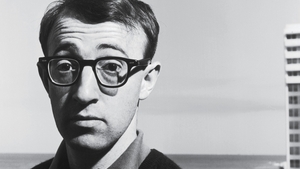
Let’s face it, there are a lot of great directors out there. Often we find a director we love and whose career we subsequently follow through each new film release. Other times, we know a director through only one or two of his films, when in reality there is a long list of great ones just waiting to be discovered. In honor of such director’s we’ve decided to showcase some of our favorites in a new series of Top 10 lists that will each focus on a specific director’s filmography.
Given the recent release of his new film, To Rome With Love, we thought Woody Allen would be a good place to start. If you’re not familiar with Allen, these films are a good jumping off point for getting to know his work, and for those of you who are already fans of the legendary director, many of these will likely make your Top 10 list as well.
——————————————————————————————————————————————————————————————
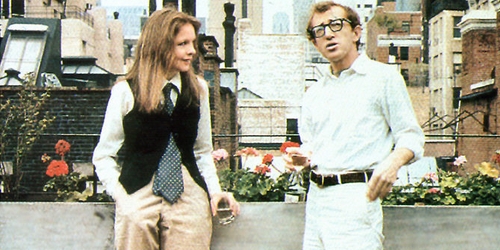
Annie Hall (1977) While Woody Allen made several notable films before Annie Hall, This is the one that really put him on the map as an influential filmmaker, and even beat out Star Wars for best picture at the 1977 Academy Awards, along with best actress, best actor and best screenplay. Perhaps the best part of this though, is the fact that Allen chose not to show up to the Oscar’s because he, “does not believe in awards,” a belief he continues to live by today. Although, now he blames basketball for his lack of appearance at the Awards.
With a background in standup comedy and improvisation, the focus of Allen’s work was always purely about making the audience laugh. Annie Hall changed that, and it’s a film that continues to influence much of his later work. This film encompasses the elements that are used today to describe “typical” Woody films: A neurotic, cynical, and witty male lead, Alvy Singer played by Allen, opposite a younger, smart, quirky female, played by Diane Keaton, in the first of many roles Keeton plays in Allen’s films; the exploration of this relationship, as the characters fall in and out of love, and an overarching existential crisis of defining the meaning of life. The one-liners are still there working, but for the first time Allen seems to lead with the heart, and the jokes fall naturally in line alongside the simple, yet somehow enchanting, conversational dialogue.
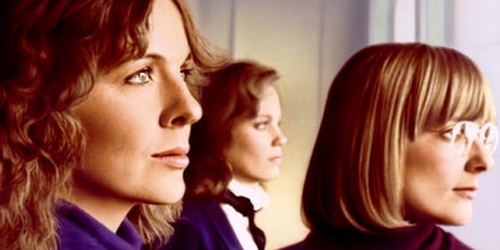
Interiors (1978) A year later, Allen made Interiors, and shocked everyone. One of his darkest films, Interiors begins to show Allen’s range as a writer/director. It’s also one of the most visual stimulating films, photographed in pale, cool colors to compliment the coolness and detachment of the characters. The influence of Ingmar Bergman, whose work Allen greatly admired, is obvious. The film focuses on the drama of an upper-class family lead by powerful female characters, and themes of faith, death and insanity. There is no comedy in this story, but there are glimpses of beauty in the sadness.
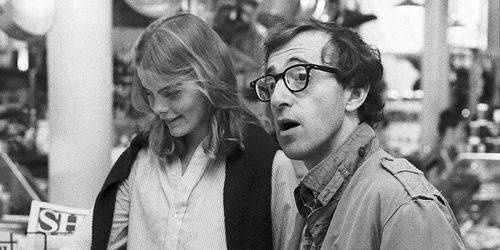
Manhattan (1979) Shot in black in white, Manhattan is one of Allen’s many love letters to the city. Allen plays Isaac Davis, a successful comedic writer who quits his job in television to write a novel. Much like Alvy Singer in Annie Hall, Issac Davis is Woody Allen personified. Manhattan, a film about love and relationships, blends the light heartedness of Annie Hall and the seriousness of Interiors. Issac is torn between the shy, neurotic journalist, Mary (Diane Keaton) and the beautiful, naive, 17-year-old, Tracy (Mariel Hemingway), and the laughs and heartaches that come out of this dilemma create the story. The true magic of the film is portrayed through Issac and Mary’s relationship, watching it from the innocent beginnings to the bittersweet end is like living these stages of a relationship in real life.
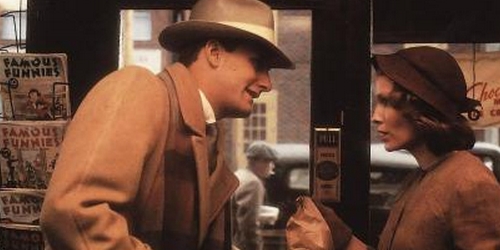
The Purple Rose of Cairo (1985) Allen is known for creating philosophical comedies, and The Purple Rose of Cairo is perhaps one of the best examples of this. The film explores the idea of watching movies as an escape from life. In this film the main character, Cecilia (Mia Farrow), finds solace in watching the film-within-a-film, The Purple Rose of Cairo, and she escapes from her husband by going to the theatre, until one day the fantasy and reality collide in a very ‘Alice In Wonderland,’ looking-glass kind of way. Ultimately the characters are faced with the very real dilemma of human nature, and the choice between the fantasies that can never be sustained, and the reality that will always disappoint in comparison to that fantasy.
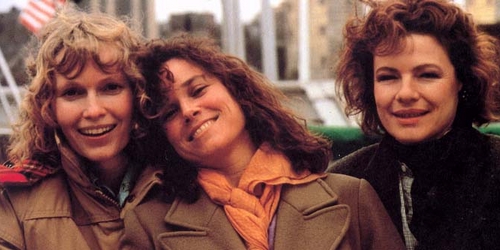
Hannah and Her Sisters (1986) In this story about three sisters: Hannah (Mia Farrow), Lee (Barbara Hershey and Holly (Diane Wiest), Allen returns to the female-dominated family narrative depicted in Interiors, but this time he is able to blend some light in with the heavy, making Hannah and Her Sisters a stronger, more rounded film that takes audiences back to the Allen of Annie Hall, both in terms of his performance in this film as well as the writing and directing. So it’s no surprise that this film also took home Oscar’s for both best actor (Michael Caine) and actress (Dianne Wiest) in a supporting role, along with best director, film editing, art direction, and best picture.
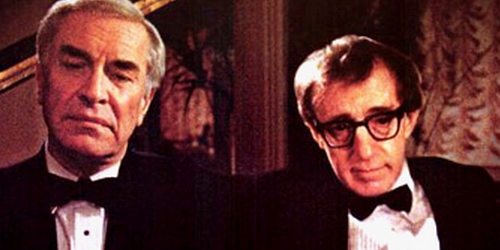
Crimes and Misdemeanors (1989) In this mix between black comedy and thriller, Allen continues his exploration of life’s unanswerable questions about death and the meaning of existence, by dividing the cast along opposite lines of the moral spectrum, and then testing their ethical limits. Dr. Rosenthal (Martin Landau) serves as the central character, but much like in previous films, Allen ties his story together with the rest of the characters, all of whom are grappling with some kind of internal moral dilemma. Whether it’s infidelity, murder, or greed, the end result is a world full of moral ambiguity and selfishness. Strangely enough, accompanied with this bleak reality is also a good amount of wit and humor, a combination that Allen is a master at delivering like no other.
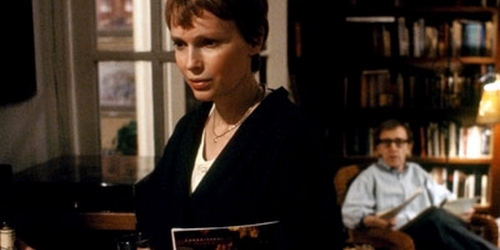
Husbands and Wives (1992) Likely one of his most autobiographical films, Husbands and Wives examines the failing marriage of Judy and Gabe Roth, played by Mia Farrow and Woody Allen, respectively, during the collapse of their own real life marriage. The film couples break up stems from the announcement that friends Sally (Judy Davis) and Jack (Sydney Pollock) are planning their own marital split. Judy Davis received an Oscar nomination for her performance as an intelligent, independent, raging, neurotic, and her character in the film is one of the best of Allen’s constructs of a woman; one who has everything, and yet, is hopelessly unhappy and filled with loneliness. She is perhaps the definition of Allen’s signature woman character. While the original release of the film was overshadowed by the real life media hype of Farrow and Allen’s split after a decade of working and living together, it’s a film worth revisiting for it’s insight into the illusions we tell ourselves about our romantic relationships, and the realities of commitment and marriage.
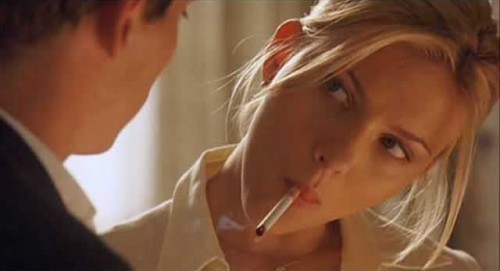
Match Point (2005) “I’d rather be lucky than good,” Chris (Jonathan Ryhs Meyers), a professional tennis player, tells the audience during the opening scenes of Match Point, as a tennis ball hits the net and bounces up in the air. Which way will it fall? It’s all a matter of luck, or so the film argues. Match Point stars Meyers opposite Scarlett Johansson as Nola, an American actress and girlfriend to the well-to-do Tom (Matthew Goode). Tom befriends Chris after giving him a tennis lesson, and Chris is quickly thrust into the family, as Tom’s sister Chloe (Emily Mortimer) takes an instant liking to him. Too bad for Tom and Chloe, Chris and Nola are more attracted to each other. They are also quite possibly one of the sexiest on screen couples in history, and there is a certain scene involving a rainstorm and an empty field to prove it. This is another film that allows audiences to see the range of Allen’s talents. It deals with philosophical questions about lust, greed and morality, and it is definitely one of Allen’s most cynical films; one that will leave you haunted by it’s conclusions long after the credits have run their course.
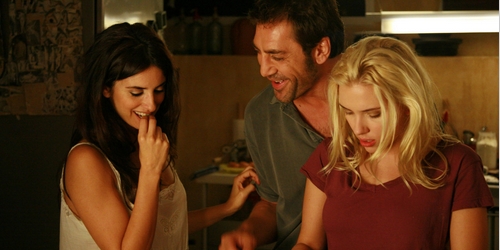
Vicky Cristina Barcelona (2008) This film begins with a voiceover narration, through the voice of Woody Allen, who introduces the audience to sensible Vicky, who is engaged to be married and impulsive Cristina who is still searching, not just for love it seems, but for a larger purpose. The two are later approached by the mysterious and handsome, artist, Juan Antonio (Javier Bardem), who first asks them to fly away with him, and then later, to join him in his room. Vicky, disgusted by his advances, declines, while Cristina willingly accepts. Cristina goes to live with Juan Antonio, and shortly after we’re introduced to his former wife, the beautiful but unbalanced Maria Elena (Penelope Cruz), who throws yet another wrench into this love triangle (square). Hilarity ensues, as Vicky and Cristina’s Spanish adventures continue throughout the summer, each of them learning lessons about themselves along the way.
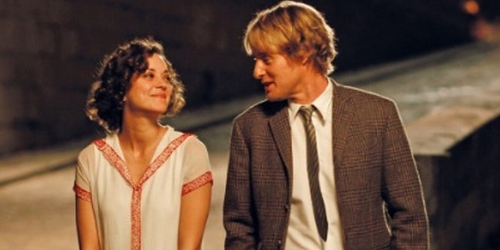
Midnight in Paris (2011) If you see one Woody Allen movie, aside from Annie Hall, this is the one to see. The film transports the audience into a magical world of Paris at night, and the references to European artists and American writers and musicians living in Paris in the 1920’s is enough to make any lover of culture nostalgic. It’s kind of like porn, for art snobs. The newly engaged couple Gil (Owen Wilson) and Inez (Rachel McAdams), come to Paris on holiday, where Gil quickly finds that perhaps Paris is his one true love. It’s magic will likely have a stronger effect on those more familiar with characters like the Fitzgerald’s, Ernest Hemingway, Gertrude Stein, Pablo Picasso, Salvador Dali, Cole Porter and Man Ray, but for those who aren’t, Allen provides a charming and fascinating history lesson through his recreation of these and other artistic and cultural legends.
Woody Allen’s career spans forty years and over forty directed films, making it difficult to pick just ten films to highlight here, and there are obviously some noteworthy ones that didn’t make the list. How much do you agree or disagree with these Top Ten; what are some of your favorite Woody Allen films?

One Comment
Andrew Crump
I really despised Vicky Christina Barcelona— I think it’s sloppy as hell in storytelling and narration– but everything else, yes, solidly. For me, Sleepers is an easy top ten candidate, but I don’t know if other people would make the same distinction. It’s not one of his more celebrated movies. If anything it’s kinda underrated.